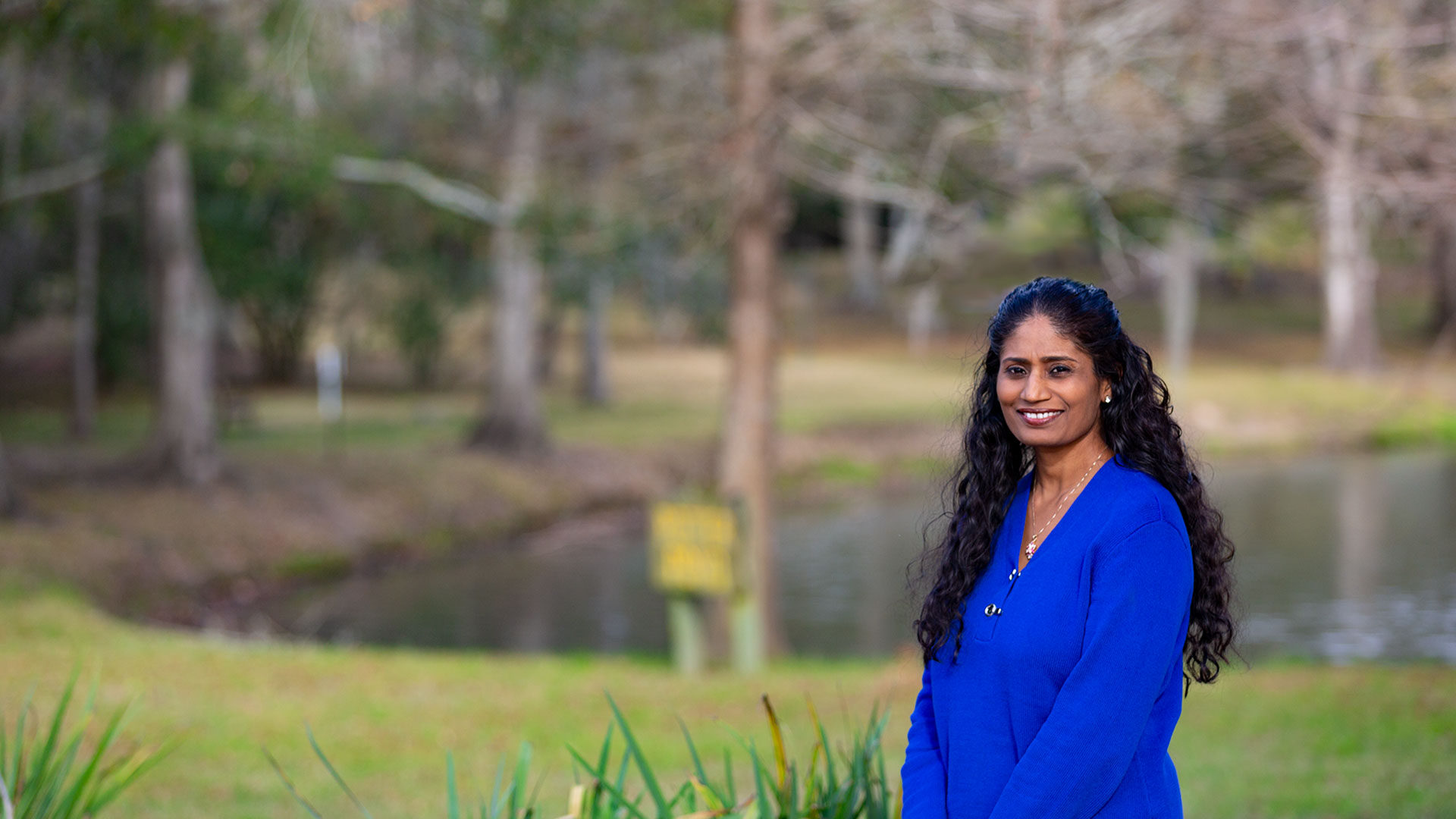Teaching in prison is a transformative experience for students and professor
January 31, 2019 | UHCL Staff

Shreerekha Subramanian grew up in India with parents who put everything into giving
her a good education. Still, she describes a “bibliographic deficit” which has informed
the rest of her life as a professor of humanities at University of Houston-Clear Lake.
Her any-book-is-worth-reading upbringing, coupled with a pivotal teaching experience
in a Baltimore high school, have combined to make her a teacher and mentor at her
core – or, as she would describe herself, a “translator” whose mission is to make
education radically inclusive.
Hired fresh out of Rutgers University with a doctorate in comparative literature in
2007, Subramanian was informed that UH-Clear Lake offered an Academics for Offenders
program at the Texas Department of Criminal Justice’s W.F. Ramsey Unit in Rosharon,
Texas. “When I was interviewing for this position, I was asked why I wanted to come
to UHCL,” Subramanian said. “I talked about my desire to teach diverse populations,
and to work with students from all walks of life. I enjoy teaching students who share
with me a profound sense of struggle. It helps me learn and helps me remember never
to get so highfalutin' that I forget how to teach the basics. All in all, I was very
gratified to hear about the university’s prison program.”
The Academics for Offenders program has been in effect since the university’s inception in 1974. “What a great institution
to have such a continuous and special program,” she said. “I was inspired to come
here because the students are historically non-traditional, and the possibility of
teaching in the prison program was an additional incentive.”
Students who are incarcerated need a great deal beyond what’s taught in books, but
Subramanian said that her students wouldn’t describe her as the nurturing type. “They
say I am difficult, and it is certainly difficult to connect with people under these
circumstances,” she said. “But there’s a mysterious thing that happens in the classroom.
Students feel that they are alive and inspired because they are reading material that
they have never experienced before, material that feels empowering and transformative.”
And dealing with people who have made mistakes in life, she explained, is not necessarily
about her own forgiving nature. “My job is to teach, not judge,” she said. “We all
make mistakes, but some of us pay a very big price. I bring a sense of intellectual
empathy to the classroom which is a mission of our university and informs the approach
of my colleagues who teach in this program.”
She said she believed that between the reading materials and the class discussions,
students are using a language in which they can express themselves. “It’s the discipline
itself,” she explained. “The material emboldens them as people; the rigor of the classroom
enriches them as students. The theories they read are empowering. The classroom comes
alive because the material is so rich. The power I bring to the class is that I take
their voice very seriously and I tell them to take their own voices very seriously.”
Subramanian said there was something magical about teaching. “Teachers are a portal
to this other universe of knowledge, and for students who are incarcerated, awakening
to this fact becomes a lifeline. This is why for me, teaching is more than talking
about the subject. It’s an act of translation.”
She explained that for her, as an immigrant, making herself clear across borders is
extremely important. “For me, that’s teaching,” she said. “Every student comes with
different levels of expertise. Some need much more translation, and I’m ready to do
that. How can I figure out how to express the same text in a new way? How can I express
these ideas so that everyone in the class is invited and included at the table? No
one should feel that education is a privilege only for the very few.”
Education, she said, should be an act of radical inclusion. “This is the philosophy
that is in my heart,” she said. “Education should include those students who feel
like they don’t belong in the classroom. We see students weighed down by an imposter
syndrome, a feeling that they don’t belong here at the university. A good education
should exorcise that sense of alienation.”
Her students are finding their voice, overcoming any imposter syndrome they may have
felt, and moving forward with their lives. Christopher Montez, who was released from Ramsey in early 2018 and graduated with
his master’s in humanities in December, said Subramanian had chaired his Capstone project and credits her with helping him
successfully complete his education. “Dr. Subramanian educates you and holds you accountable,”
he said. “With her, you’d better have your stuff in order.”
Like all incarcerated students, Montez has paid in full for his tuition through loans
available through the Department of Corrections, which he’s repaying, as well as out
of pocket.
“To be surrounded by books and make them available to all students so they can have
that same relationship with books is such a fortunate life to have,” Subramanian said.
For more information about UHCL’s Academics for Offenders program, visit www.uhcl.edu/human-sciences-humanities/centers-initiatives/academics-for-offenders.
About the Author:
Recent entries by
October 18 2022
Better technology transforms campus safety: Police Chief demonstrates SafeZone to students
October 14 2022
Student's skill with drones takes chicken turtle research to new heights
October 11 2022
Planting event to help UHCL restore native plants to campus, support environmental sustainability







